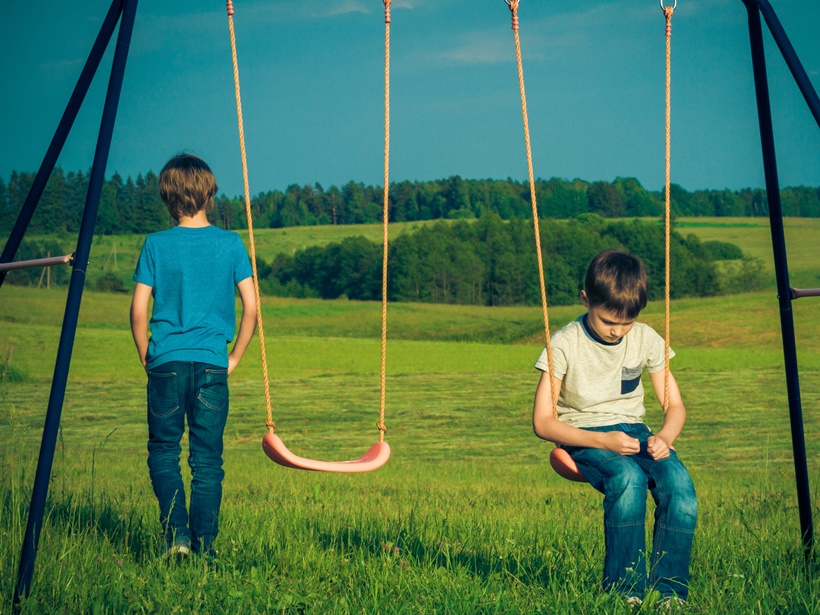Learn to spot the symptoms and help children deal with anxiety.
By Dr Vihan Sanyal
Children experience symptoms of anxiety right through childhood. Some amount of anxiety is healthy and necessary for development. They may encounter different levels of anxiety during different stages of their life. It is not uncommon for children from eight months until they turn three to experience separation anxiety. This is why they cry if separated from their parents.
Pre-schoolers get stress too
The first day of daycare or pre-school can become a nightmare for most parents as many children scream and cry on being separated from their parents. This level of separation anxiety is common and a part of childhood. It is when deep-rooted fear takes place, when a child begins to feel neglected or abandoned by the parents that it’s often a case of concern.
It is common for children to develop fears of insects, of certain animals like dogs or cats, of dark places or of certain imaginary people who according to them come out at night during pre-school years.
Social anxiety
As children become older they can exhibit symptoms of social anxiety. Children with social anxiety tend to avoid social situations. They may dread to speak in front of people. They become self-conscious and worry about others judging them. They are not quick to make friends with others and tend to avoid group sports, team projects, school excursions and even large family gatherings.
When children experience anxiety, there is often a surge of chemicals which become activated in their body. This is the “survival mechanism”. The prefrontal-cortex (area of our brain responsible for reasoning and logic) is paused, as emotions take control. Once this happens, it becomes difficult for children to think clearly. They enter a state of confusion and become incapable of responding to situations with urgency.
Children with anxiety have some of these symptoms:
- Tend to cry easily.
- Throw tantrums.
- Become easily irritable and angry.
- Get startled easily.
- Have a bed-wetting problem.
- Experience sleep problems. (Trouble falling asleep and/or waking up through the night)
- Experience frequent nightmares.
- Unable to sit still or stay in a particular area for long (restlessness).
- Have a change in eating habits (eating too much or not enough).
- Keep nagging until their demands are met.
- Physically trembling and shaking .
- Become unable to handle general pressure from parents and from teachers at school.
- Worry about parents leaving them.
- Worry about parents separating from each other.
- Worry about bad things or disasters happening to the family in the near future.
- Are troubled by repetitive negative thoughts.


Seven ways to help children cope with anxiety
Expressing emotions
Allow children to identify and express their emotions. Patience is the key here. Teach children to recognise their feelings and face them, not to ignore them or escape from them. For instance, a boy must be given the freedom to cry and a girl must be allowed to feel emotional pain on being rejected. Being a supportive caregiver, it is essential to give children the space they need to express themselves fully. It is best to become a witness and not to interfere in the process. Ask children to explain their feelings to you and ask them what they would like to do to cope better with the situation. Just listen supportively and make yourself available to them if they need your inputs. Don’t preach at them.
Mindfulness
Encourage an anxious child to be in the present moment. Teach them to be more mindful of the present and to appreciate things in the environment. Encourage them to focus on the positive things and to be grateful for them.
Compassion
Teach them to be more compassionate and forgiving. When a child complains about something a sibling or another child has done, help them differentiate the person from their behaviour. Tell them that just because their friend did something they did not like, it does not make them bad people. Help them to see the difference. This helps children become more tolerant of others and become compassionate adults.
Lead by example
Children model the behavior of their parents and teachers. If they see parents becoming anxious during times of stress at home and see their teacher behave the same way at school it reinforces a belief that this is considered as “normal” behaviour during times of stress. Hence, staying calm during times of stress will teach children to become more resilient to everyday stressors and they will cope better during testing times.
“What if?” thinking
“What if I fail in my exam, then my parents will scold me, my friends will laugh at me, my teachers will be disappointed with me…” These are examples of dialogues a child has internally. Many children think of impending danger and create negative scenarios of the future in their minds. If this type of thinking is not corrected early on, it can become a habit, restricting children from enjoying their childhood.
It is important to help children focus on the present and to help them realise that they are mentally living in the future, which is unhelpful.
If the child has given his best and still was unable to pass an exam, it is important for parents and teachers to be supportive to the child. Help the child to look at the bigger picture.
Tell them to focus on the lessons learnt from the failure and to rectify them if possible, so that they don’t repeat the same mistakes again.
If the child is not responsible with his studies, then it is important for parents to teach children the importance of “actions” and of facing “consequences” in a loving way. An example would be, “If you spend more time watching TV and not studying for your exam, then it can impact your exam results. I just want to see you successful and happy in life; I am here if you need my help. I am proud to see you put in the efforts you do with your studies.” These are all statements of encouragement and will help strengthen your bond with your child and they will learn to take responsibility for their actions from a young age. It is important to teach children to be self-reliant from a young age.
Stop instilling fear
“Don’t go close to the street dog, he might bite you”; “Quickly finish your breakfast else your Dad will become angry”; “Go to sleep now or else the monster will come”.
Many parents and teachers teach discipline by warning children of the negative consequences of their behaviour. This creates fear within the child. The outcome is likely to be a child that is timid and may develop anxiety disorders.
Teach self-love
Encourage children to love who they are. Often talk about their strengths and keep telling them how proud you are of them. Ask them what they like about themselves the most. Highlight their strengths. Children are motivated by love. If they know that you genuinely care for them with love and understanding, then they are likely to reciprocate this love and care. They will become more resilient when faced with challenges in life.
(The writer is a Mumbai-based psychotherapist.)
Source: Read Full Article





